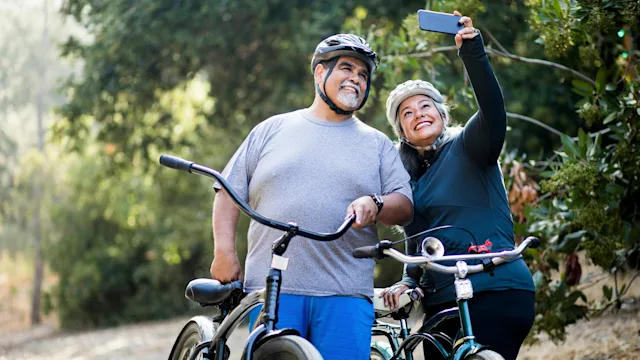Key takeaways:
Ever since she was in elementary school, Patty Nece has heard people call her names because of her weight.
She sees weight discrimination as society’s last permissible bias, and she wants to change that.
Today, Patty is an advocate for people with obesity.
Patty Nece was in third grade when the school nurse rolled a scale into her classroom and had each student step up so she could record their height and weight.
“She took my height. She took my weight. And she turned to me and said, ‘You’re fat. You need to lose weight,’ in front of all my peers. A person in authority was calling me out because of my weight, and I just wanted to crawl under my desk,” remembers Patty, 63, who recently retired after 37 years with the U.S. Department of Labor. “She wasn’t praising me for my straight A’s or perfect attendance. No, she was calling me out because of my size.”
Patty can’t remember a time in her life when she hasn’t experienced weight bias — that is, having people treat her poorly or hold negative opinions of her because of her weight.
Our society still allows weight bias
Weight bias may be the last permissible prejudice. People living with obesity are presented as lazy or ignorant. Reality shows like “The Biggest Loser” further the myth that anyone can lose weight if they simply eat less and exercise more, while overweight sitcom characters are written as the butt of jokes. Influencers on Facebook and Instagram share diet tips, presenting weight as a solely cosmetic concern, and post photos that document “success.”


Patty has been verbally assaulted by strangers who’ve called her “Shamu.” She visited a car dealership and was ignored by most of the salespeople who “curb qualified” (or prejudged) her based on her size, according to the salesperson who helped her. She’s had children approach her in stores and ask, “Why are you so fat?”
“One even poked my belly and, in that case, the adult expected me to answer the question. She stood there, staring at me, like, ‘Well ...,’” Patty says. “No one says that’s not appropriate behavior. It shows how embedded weight bias is in our society.”
Ignored are the genetic, psychological, and hormonal components that can lead to obesity — from our earliest days, and sometimes even before birth.
Patty knows one obesity medicine specialist who tells female patients, when they say they don’t understand why they’re not losing weight from eating less and exercising more, “Stop ovulating.”
“[The patients] say ‘I can’t do that,’ and they get the notion that there are things going on physiologically that are not within your control,” Patty says. “That doesn’t mean that you don't have to take personal responsibility, and eat well and move. I mean, it’s all part of the package, but it’s not to the exclusion of that. That’s too simplistic. It’s too simplistic because our bodies are much more complex.”
Read more like this
Explore these related articles, suggested for readers like you.
Years of being judged took a personal toll
Patty says years of being judged because of her weight really took a toll on her self-esteem.
“By the time I was an adult, I believed everything people said. No matter what successes I had in life, in my career, I couldn't get a handle on my weight, and that left me feeling so ashamed,” she says.
“I felt that it was all my fault and that I deserved what people were saying to me. I deserve to be ridiculed and bullied. Because conventional wisdom is, ‘Weight: It’s all within our control,’” she says.
Positive change began about 10 years ago, when she started working with an obesity medicine specialist. “I’d become my own worst bully,” she says of the realization she had about negative self-talk.
“I was walking down the hallway at work one day and I heard somebody say to me: ‘You’re a fat pig. You’re getting out of breath. You can’t even control your weight. You are such a failure.’ And there was nobody there,” Patty recalls.
“I stopped dead in my tracks. Like, did I just say that to myself?” she remembers. “That’s when I realized the damage that all the weight bias my entire life had done.”
Passionate about changing the obesity narrative
Working with an obesity medicine specialist has been life-changing, Patty says. To help heal herself, she began speaking out for others.
She has testified before the FDA multiple times about the need for more science-based obesity treatments. A longtime member of the Obesity Action Coalition, she was the recipient of the organization’s 2015 Barbara Thompson Award for Advocacy. And, in 2021, she became the chair of the organization, which has an initiative called the Stop Weight Bias Campaign.
“I’m passionate about changing the narrative,” she says. “Frankly, it’s a human rights issue. People of size deserve dignity and respect.”
Patty continues to work with her obesity medicine specialist and says she has lost weight. But she doesn’t want to disclose how much she currently weighs or how much weight she’s lost, as she knows those numbers will become the first things readers see.
“It’s not about weight. Health is the point,” she says. “Removing some of the shame and blame and guilt that I felt my whole life sort of liberated me.
I feel better about myself. I have much better self-esteem, and it’s amazing. I’ve had a lot of successes in life — with relationships and with my career — but until you get past the weight issues, it’s like an anchor is dragging you down.”

Why trust our experts?




















